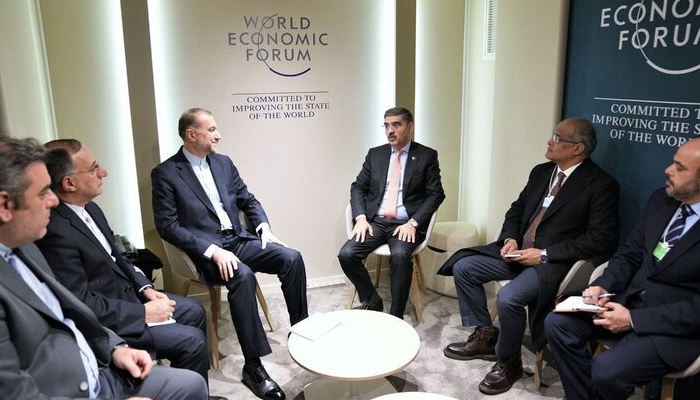In meeting with PM Kakar, Iranian FM didn’t share attack plan
As the situation has grown serious, Kakar is returning to Pakistan today (Thursday) by cutting short his visit
ISLAMABAD: Although the Iranian foreign minister met the Pakistani prime minister on the sidelines of Davos Forum shortly before his country carried out the airstrike, he didn’t give any hint of the plan in this regard.
According to an official traveling with Prime Minister Anwaar Kakar, the top Iranian diplomat, Hossein Amir-Abdollahian, didn’t share his country’s reservation, if there was any, during the meeting. The PM was surprised when he came to know about the attack announced after the meeting was held.
As the situation has grown serious, Kakar is returning to Pakistan today (Thursday) by cutting short his visit. Earlier, he was scheduled to come back on January 22. He wanted to return late Wednesday but couldn’t make it due to the flight schedule as he went to Switzerland by a commercial flight, according to the official.
Iran remained tightlipped about the attack. A news agency considered close to the Iranian Revolutionary Guards Corps (which carried out the strike) initially ran the story only to be withdraw later. On the other hand, Pakistan summoned Iranian charge d’affaires to record a protest and later recalled the ambassador in Tehran while refusing to welcome back the Iranian ambassador, who is presently in his home country.
It was only after this that Iran broke the silence and accepted the responsibility. The country’s foreign minister acknowledged the strike took place inside Pakistan. However, he said it was aimed at Jaish al Adl, a terrorist group which, he alleged, is linked with Israel. Jundullah, an al-Qaeda affiliate, was the parent organisation of Jaish. His founder, Abdolmalek Regi, was apprehended and executed by Iran in 2010. Pakistan is said to have cooperated in his arrest.
That strike carried out soon after the Iranian foreign minister’s meeting with PM Kakar in Davos was not the only surprise as bilateral meetings were in progress a while ago. Iran’s special representative on Afghanistan met Foreign Minister Jalil Abbas Jilani earlier this week. One-day naval exercises of Pakistani and Iranian forces also took place on January 16.
Why Iran acted in haste remains unclear. However, it coincides with the attacks carried out by Iran in Iraq and Syria a day ago. Analysts speculate that such strikes might lead to the widening of the Middle East conflict which started from Hamas-Israel conflict leading up to tensions in Lebanon and also in Red Sea where Yemen’s Huthis are attacking ships which are “Israel-owned, flagged or operated or which are heading to Israeli ports”.
-
 Ghost's Tobias Forge Makes Big Announcement After Concluding 'Skeletour World' Tour
Ghost's Tobias Forge Makes Big Announcement After Concluding 'Skeletour World' Tour -
 Katherine Short Became Vocal ‘mental Illness’ Advocate Years Before Death
Katherine Short Became Vocal ‘mental Illness’ Advocate Years Before Death -
 SK Hynix Unveils $15 Billion Semiconductor Facility Investment Plan In South Korea
SK Hynix Unveils $15 Billion Semiconductor Facility Investment Plan In South Korea -
 Buckingham Palace Shares Major Update After Meghan Markle, Harry Arrived In Jordan
Buckingham Palace Shares Major Update After Meghan Markle, Harry Arrived In Jordan -
 Demi Lovato Claims Fans Make Mental Health Struggle Easier
Demi Lovato Claims Fans Make Mental Health Struggle Easier -
 King Hospitalized In Spain, Royal Family Confirms
King Hospitalized In Spain, Royal Family Confirms -
 Japan Launches AI Robot Monk To Offer Spiritual Guidance
Japan Launches AI Robot Monk To Offer Spiritual Guidance -
 Japan Plans Missile Deployment Near Taiwan By 2031 Amid Growing Regional Tensions
Japan Plans Missile Deployment Near Taiwan By 2031 Amid Growing Regional Tensions -
 Meghan Markle, Prince Harry Spark Reactions With Latest Announcement
Meghan Markle, Prince Harry Spark Reactions With Latest Announcement -
 Kate Hudson Reflects On Handling Award Season With No Expectations
Kate Hudson Reflects On Handling Award Season With No Expectations -
 6 Celebrities Who Have Been Vocal About Anxiety And 'panic Attacks'
6 Celebrities Who Have Been Vocal About Anxiety And 'panic Attacks' -
 Is This The Future Of Train Travel? Robot Dogs, Drones Are Redefining Public Transit Safety Through China’s New Metro Station Deployment
Is This The Future Of Train Travel? Robot Dogs, Drones Are Redefining Public Transit Safety Through China’s New Metro Station Deployment -
 Sarah Ferguson Seeks Hollywood Backing As Epstein Files Resurface
Sarah Ferguson Seeks Hollywood Backing As Epstein Files Resurface -
 China’s AI Milestone: ByteDance’s Doubao Chatbot Hits 100M Users During Lunar New Year
China’s AI Milestone: ByteDance’s Doubao Chatbot Hits 100M Users During Lunar New Year -
 Think You Know ChatGPT? Here Are 5 AI Levels You’ve Never Seen
Think You Know ChatGPT? Here Are 5 AI Levels You’ve Never Seen -
 Bitcoin Bounces From $62,000 As On-chain Metrics Signal Prolonged Weakness: Here Is Everything To Know
Bitcoin Bounces From $62,000 As On-chain Metrics Signal Prolonged Weakness: Here Is Everything To Know




